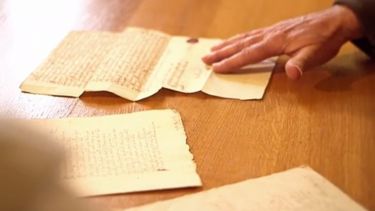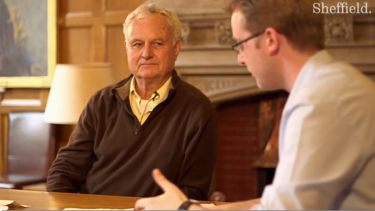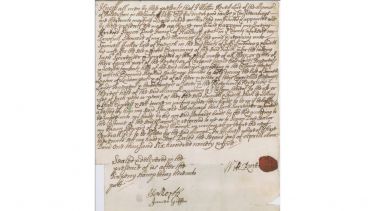Literature of the English Country House: A manuscript authorisation for a servant from a country house owner
On Literature of the English Country House, our learners have been intrigued by one step titled ‘Material Conditions: Working with Manuscript Material.’ The educator behind that step, Dr Jim Fitzmaurice, discusses one of the featured manuscripts in more detail.

In the video for step 2.9 some of our eagle-eyed learners noticed a manuscript lying on the table, and have asked for more information on this one manuscript in particular. That manuscript authorises a high-level servant called a steward to negotiate on behalf of the country house owner, William Revett.
Revett is referred to as the “lord of the manor”. The document is signed and sealed, which is to say that there are the signatures of two witnesses and a red wax seal.
Much country house business was undertaken by stewards, who often became powerful and sometimes found ways to enrich themselves at the expense of the country house owner. And, of course, they liked to exercise power over lesser servants and others in a household.
An excellent example is Malvolio in Twelfth Night, who brings a halt to the midnight revelry of Maria, Feste, and Sir Toby. Sir Toby’s reaction to this steward includes the famous phrase, "no more cakes and ale".
Sir Toby
Art [thou Malvolio] any more than a steward? Dost thou think because thou art virtuous there shall be no more cakes and ale?
Feste
Yes, by Saint Anne, and ginger shall be hot i’ the mouth, too.
Sir Toby
Th’ art i’ th’ right. Go, sir, rub your chain with crumbs. A stope of wine, Maria.
Malvolio, who carries the chain of a steward, thinks he might marry Olivia, the mistress of the house, perhaps because of the power that he has accumulated has gone to his head. Still, servants sometimes did marry owners of country houses. Margaret Cavendish discusses a marriage between a kitchen maid and an owner in Sociable letters, letter 42.
But perchance Sir F.O. Married his Kitchin-maid in hopes she would make a Nimble and Obedient Wife, which he might fear one of Equal Birth would not be; Indeed he hath chosen one out of the humblest Offices, or Houshold Imployments, for the Kitchin for the most part is the lowest Room in a House; Yet I write not this as believing he may not be Happy in his Choice, for ’tis likely the Match may be more Happy than Honourable.
I, for one, am pleased that Margaret is not outraged by the marriage. Amused, but not outraged.
The limited authorisation in our manuscript is careful to allow that the person named can only act on behalf of the owner in this one instance, and the document uses legal language or legal sounding language.
Often there are sets of words in threes, as with “authorise, constitute, and appoint”. The hand is largely italic but with some secretary mixed in, as is the case with many writers of the time.
I first transcribed the letter into an original spelling text. You will notice a lack of punctuation and haphazard use of capitalisation. There was no real standard for spelling at the time. Then I modernised the spelling, added punctuation, and regularised capitalization, as well as expanded abbreviations. The modernised version might be used for a school text. An image of the manuscript and my own transcription are posted below.
But before you look at what I have done, transcribe and modernise the text yourself. Let’s see how close we come to one another in this work.
William Revett’s Limited Power of Attorney
Unedited transcription
Know all men by these presents that I Willm Revett Lord of the Mannor of Bilderston in the County of Suffs Esq for divers good cause and Considerations me thereunto moveing Have made authorized constituted and appointed and by those presents doe make authorize constitute and appoint my Loveing friend Simon Dove Iunior of Hadleigh gent in ye County aforesaid my Lawfull Steward of my said Mannor for the going and repairing unto Samuell ffuller late of Ipswich in the said County of Suffs Linendrage and Judith his wife for the sole and secret Examining of the said Judith and for the takeing such surrender and surrenders as they shall make of all their or either of their fourth part of the Revertion of Certaine Coppiehold Land Tenemente and Hereditamente held of the said Mannor according to the Custome thereof to which Edmund Shepherd Stands now Admitted to hold during the life of Samuel Layton of London gent and also of all their and either of their Coppieholds Messuages Land Tenement and hereitamente whichever and the Revertion and Revertions thereof held of the said Mannor according to ye Custom thereof To the use or uses of such person or persons as they the said Samuell and Judith shall be willing and shall Express and sett down in writing under their hands to be in ye behalf attested by him my said Steward Soe always that such surrender or surrenders be made unto my hands by his my said Stewards hands by the Rod according to the Custome of the said Mannor and returned to me or to Simon Dove Senior my known Steward of ye said Mannor in writing at or before the next Generall Colt to be holden for the said Mannor In Wittness whereof I have hereunto sett my hand and Seal Dated the Second day of Aprill Anno Dom One thousand six hundred ninety and five.
Sealed and delivered in the Will Revett [SEAL]
Presence of us after the
Sixpenny stamp being hereunto
Putt
Hen North
James Gibson
Modernised edition
Editorial practice: spelling, capitalisation, punctuation and abbreviations modernised
Know all men by these presents that I William, Revett Lord of the Manor of Bilderston in the County of Suffolk, Esquire, for divers good causes and considerations me thereunto moving have made, authorized, constituted, and appointed and by those presents doe make, authorize, constitute, and appoint my loving friend Simon Dove, junior, of Hadleigh, gentleman in the County aforesaid my lawful steward of my said Manor for the going and repairing unto Samuell Fuller late of Ipswich in the said County of Suffolk, Linendrage [village?] and Judith his wife for the sole and secret examining of the said Judith and for the taking such surrender and surrenders as they shall make of all their or either of their fourth part of the Reversion of certain copyhold land tenement and hereditament held of the said Manor according to the custom thereof to which Edmund Shepherd stands now admitted to hold during the life of Samuel Layton of London gentleman and also of all their and either of their copyholds messages land tenement and hereditament whichever and the reversion and reversions thereof held of the said Manor according to the custom thereof to the use or uses of such person or persons as they, the said Samuel and Judith, shall be willing and shall express and sett down in writing under their hands to be in the behalf attested by him my said Steward so always that such surrender or surrenders be made unto my hands by his, my said Stewards, hands by the Rod according to the custom of the said Manor and returned to me or to Simon Dove Senior my known steward of the said Manor in writing at or before the next General Colt to be held for the said Manor. In witness whereof I have hereunto sett my hand and seal. Dated the Second day of April, Anno Domini One thousand six hundred ninety and five.
Sealed and delivered in the William Revett [SEAL]
Presence of us after the
Sixpenny stamp being hereunto
Put
Henry North
James Gibson
Notes
“know all these men by their presents”: These presents] these people present, i.e., the witnesses.
“Judith his wife for the sole and secret”: ‘Secret’ probably here “private”.
“their copyholds messages”: ‘Messages’ here means legal document.
“hands by the rod”: ‘Rod’ here is possibly a person of authority like Black Rod of the Parliament.
“the next General Colt”: ‘General Colt’ here is unclear, perhaps a local fair or assize.
“six penny stamp”: The six penny stamp is on the other side of the manuscript. This stamp may indicate that the document has been notarised.
Written by Jim Fitzmaurice, on 10 July 2015.


